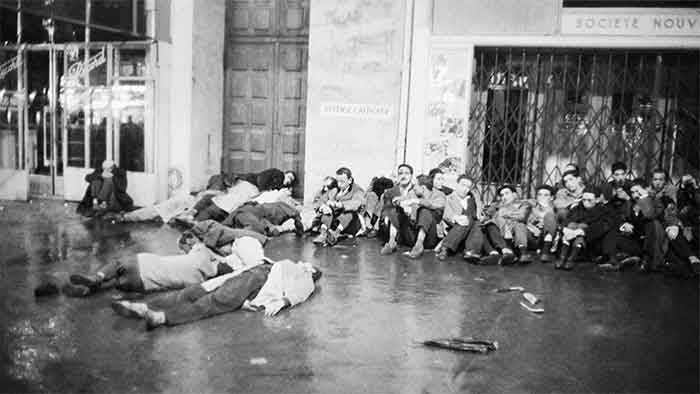
Commemorations were held on Oct 17 to mark the 60th anniversary of a bloody Paris police crackdown on a demonstration by Algerians that occurred during the final year of the struggle for independence from the colonial power France.
Human rights and anti-racism groups as well as Algerian associations staged a tribute march in Paris on Sunday and called on authorities to recognize France’s responsibility for the “tragedies and horrors” related to Algeria’s independence war.
Participants at the commemoration called on authorities to open up the archives on the bloodshed in France’s capital that day. “It’s high time on this 60th anniversary that a strong statement be made at the highest level of the state,” historian Naima Huber Yahi told Al Jazeera.
On October 17, 1961, protesters held a peaceful demonstration against a discriminatory night-time curfew targeting Algerians in the Paris region. About 12,000 Algerians were arrested and dozens were killed, their bodies thrown into the Seine River.
Speaking at the event, Macron told relatives and activists the crackdown on the protest under the command of notorious Paris police chief Maurice Papon was an “unforgivable crime”. Yet, he stopped short of giving a public speech and issuing a formal apology. He simply has never recognized the state’s responsibility in this massacre.
Rebuffing controversial statements by France’s president about the colonial period in Algeria, the nation’s parliament Saturday said that on a single day in 1961, some 300 peaceful Algerians were massacred by the French police.
A special session of the National People’s Assembly, the lower house of Algeria’s parliament, was held to mark the 60th anniversary of the Oct. 17, 1961 massacre in Paris.
The massacre, according to Parliament Speaker Ibrahim Boughali, remains a shameful stain on France, because crimes against humanity do not expire.
Algerian Muslim scholars refute Macron’s claims on Ottomans
Meanwhile, the Association of Algerian Muslim Ulema has rejected French President Emmanuel Macron’s recent claims that the Ottoman presence in Algeria amounted to colonization.
In a bid to palliate its atrocious colonial past, Macron claimed that “there was a colonization before the French colonial rule” in Algeria, alluding to the Ottoman presence in the country between 1514 and 1830.
“The Ottomans who came to Algeria did not come as colonial occupiers, rather (they came) at the invitation of the Algerians … to help them defeat the Spanish Crusader aggression,” Abdul-Razzaq Qassoum, the association’s chairperson, said in a column by the Al-Basair newspaper. The newspaper is affiliated with the association.
According to Qassoum, the Ottomans, unlike France, did not kill Algerians, destroy their land or plunder their wealth. Algerians “possessed a lot of wealth (under the Ottomans),” the Algerian scholar said.
He also noted that the Ottomans neither imposed their language on Algerians nor fought their beliefs.
“They (Ottomans) did not fight our belief, not even our Madhab (Islamic school of law).”
On the contrary, Qassoum said the French colonial forces brought “tragedy” to Algeria and “misery” to its people.
Macron’s remarks in late September that the Algerian nation did not exist before French colonial rule and that another colonization preceded his country’s sparked a storm of condemnations in Algeria.
Algerian President Abdelmedjid Tebboune condemned Macron’s remarks as an “unacceptable insult” to the victims of French colonial rule, recalled his country’s Ambassador to France Antar Daoud for consultations and closed airspace to French military aircraft used by the latter in its counterterrorism operations in the Sahel.
In a televised interview, Tebboune narrated an official account of the French massacre of nearly 4,000 worshipers during the 1830-1962 colonial era. The worshipers were killed as they staged a sit-in inside an Ottoman Mosque called Ketchaoua in an effort to stop it from being converted into a church.
Algeria represents the most recent and bloodiest example of France’s colonial history on the African continent.
Approximately 1.5 million Algerians were killed and millions more displaced in an eight-year struggle for independence that started in 1954, according to historians.
France had also committed cultural genocide against Algeria during the colonial era starting in 1830, destroying Algeria’s 300-year-old Ottoman history and its own local identity while transforming many cultural and religious monuments in the country, Anadolu News Agency reported.
Skulls of Algerian fighters
Tellingly, the display of nearly 40 skulls of Algerian fighters put on display at the National Museum of Natural History in Paris is seen another manifestation of French atrocities during their brutal occupation of Algeria from 1830 to 1962. The skulls of Algerian fighters were taken to France as war trophies in the 19th Century.
In July 2020, France returned 24 skulls of Algerian fighters.
In 2011, Algerian historian and researcher Ali Farid Belkadi discovered the skulls at the Museum of Man in Paris, across from the Eiffel Tower, and alerted Algerian authorities.
The returned skulls belonged to two dozen fighters who were members of Algeria’s resistance movement that were killed and decapitated during the mid-19th-Century conflict. Among the key figures repatriated were Bou Amar Ben Kedida and Si Mokhtar Ben Kouider Al Titraoui.
Seven of those in the collection were remains of resistance figures dating back to the famous Battle of Zaatcha in 1849, in which over 1,000 people were massacred. The skulls include those of Sheikh Bouziane, who led the resistance during the Zaatcha siege, and Mohamed Ben Allel Ben Mbarek, the lieutenant of the national resistance figure Emir Abdelkader.
Among the remains were those of revolt leader Sheikh Bouzian, who was captured in 1849 by the French, shot and decapitated, and the skull of resistance leader Mohammed Lamjad ben Abdelmalek, also known as Cherif Boubaghla (the man with the mule).
A military ceremony took place on the tarmac at Houari Boumediene Airport to receive planes carrying the skulls. President Tebboune welcomed them, remarking in a speech that the fighters “had been deprived of their natural and human right to be buried for more than 170 years.”
Abdus Sattar Ghazali is the Chief Editor of the Journal of America (www.journalofamerica.net) email: [email protected]










































